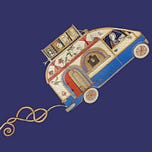Selva Oscura
The Oldsmobile was so wide and solid that it hardly rattled at all on the old narrow bridge, although it didn’t leave much room for the cars crossing the Mississippi the other way. From the back seat, Sister Eunice looked out at the passing trusses, flickering like her memory, and down at the swirling waters that divided a continent.
La Signora must have known, she thought.
What La Signora Caporicci must have known, when she gave her young student the two articles in Italian about Matilda of Canossa, was that Eunice Larkin was on a cusp—that she hungered, in a way, for both versions, both Matildas, both worlds. The girl, holding on to her childhood, wanted to believe in a holy warrior princess; the young woman, who already knew that Dubuque held no future for her, wanted to scrub away the lies. What La Signora could not have anticipated was the intensity of both reactions.
Well that was the beginning, thought Sister Eunice, the beginning of my crisis of faith.
At the time, she told no one—not her mother, not La Signora, certainly not the nuns at school. For the next two years she wandered in her private selva oscura, a sullen, secret atheist. She became amoral and delinquent as well, in a quiet way: she stole small things from La Signora’s apartment, lied about the stationer’s bill, and buried some of her little sisters’ dolls in the back yard. She couldn’t hate God because for her He didn’t exist, but she hated the godless world, and her godless self, until, during Easter Morning Mass in her last year of high school—she had never stopped going to Mass, that would have been impossible—she saw that commitment was the only remedy for a doubt so ravaging, and for the first time in almost two years she swallowed the Host, instead of spitting It into her veil with a discreet hateful cough.
On her 18th birthday, she surprised everyone by announcing her vocation. She spent the next week cleaning La Signora’s apartment, one last time, as a kind of recompense for all the sins she still had not confessed. The next Sunday, her uncle put her single suitcase in the rumble seat of his Model A, and drove her to Sinsinawa. Her sisters waved goodbye from the porch. Her mother, holding a fussy new baby, held up the tiny hand and waved from a window.
But just what, she wondered as the Oldsmobile came off the narrow bridge and turned onto the streets of Dubuque, just what had happened to that stack of exercise books? The books she had filled, in beautiful cursive script, with the story that she had believed, for a few days, to be the blessed biography of Matilda of Canossa? She had vague recollections of intending to take the books out of town, to a corn field somewhere, and destroy them in a midnight bonfire. But had she ever done so? Had she just hidden them in a closet? Or the attic? Could they have possibly survived all these years? She looked down at the book in her lap. If she opened it, would she be able to recognize what she had written—the prose of a sixteen-year-old clinging desperately to a child’s faith?
As the Oldsmobile pulled into a space marked “Fr. Bresnahan,” Sister Eunice decided that the negotiations about to begin would be better served if she left those questions unanswered. She put the book, unopened, back into her satchel.
Next episode: Hotel Mercure
For the impatient:
Buy ebook, audiobook on Amazon
Buy paperback on Lulu
Or just wait for the next episode…










